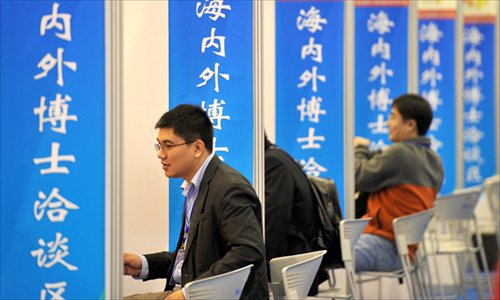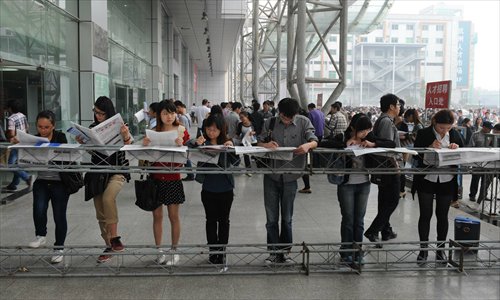Coming back to live their dreams

Applicants talk with potential employers at a job fair designed for returned overseas students with PhDs. Photo: CFP

Students read guiding pamphlets while waiting outside a job fair site on October 27, 2012 in Hangzhou, Zhejiang Province. Photo: CFP
This summer, 25-year-old Liu Yi is experiencing the culture shock of coming home. She needs to learn how to cross the road not based on the traffic light but the number of pedestrians crossing with you, and whether to work out or not depending on the shades of grey in the sky.
Nevertheless, this is home. After studying and living abroad for 12 years, Liu finally made the decision to come home and start her career in China.
"Life abroad is routine and boring, you do the same thing every day and you can predict what it will be like in 10 or 20 years," Liu told the Global Times.
After graduating from a university in Los Angeles with a master's degree in biomedical engineering, Liu got an offer from PKUcare Pharmaceutical R&D Center to be an investment researcher.
"My family doesn't really agree with me coming back to China, my mother thinks China is too complicated for me," she said. "But I see many opportunities here."
Homeward bound
From 1978 to 2012, more than 2.6 million Chinese studied abroad, placing the country atop global rankings in terms of the number of overseas students. In 2012, about 400,000 Chinese students went to study abroad either paid for by the government or at their own expense, according to the Chinese Service Center for Scholarly Exchange under the Ministry of Education (CSCSE).
They are known as "sea turtles" as in Chinese this phrase sounds the same as "returned from overseas." Now like Liu, many "sea turtles" are crossing the ocean on their way back home. Last year, some 300,000 Chinese returned, an increase of 46 percent from 2011, according to the figures.
Since China opened up to the world in 1978, about 1.1 million Chinese overseas students have chosen to return to China after finishing their studies.
Wang Huiyao, president of the China Global Talents Society, told the Global Times that many returning Chinese students dream of a better future back home.
"They are global talents, they can survive everywhere, but they decided to return home because they want to participate in the big 'Chinese Dream,'" Wang said. "It is a dream that combines with the country, society and individuals."
The year 2013 might be similar to the 1960s in the US when the American Dream was arguably at its apogee.
The Chinese Dream was first invoked by China's new President, Xi Jinping. He endorsed the phrase during his visit to the exhibition of "the Road Toward Renewal" at the National Museum in Beijing in November 2012.
After he became president in March, he described the term as denoting the reemergence of China as well as embodying the people's dreams.
"The Chinese Dream, after all, is the dream of the people. We must realize it by closely depending on the people. We must incessantly bring benefits to the people," Xi said in a speech delivered to the country's top legislature, according to the Xinhua News Agency.
Xi also called on young Chinese people to contribute to the revitalization of the nation and "hone themselves at the grass-roots level."
Each "sea turtle" has their own vision of the Chinese Dream: earning more money, staying near family or getting married. One thing they have in common is they all dream of a better future in China.
Wang explained that rapid economic development of China is the main reason that pushes "sea turtles" to go home.
Predictions that China will surpass the US in economic size within the next decade are becoming increasingly loud. A report released by the Organization for Economic Cooperation and Development predicted that China would overtake America as the world's biggest economy in 2016.
"You might earn a decent yet fixed salary in the US but you might be able to make big money in China," Liu said, adding that she hopes one day she can start her own business.
The economic downturn, the high unemployment rate and immigration policy have all sped up these returns to China. More and more American employers are reportedly less likely to hire new employees, especially foreigners. The UK also tightened its visa policies to make it harder for foreign students to work in the UK after graduating.
Dream vs reality
About 80 percent of students who return are aged between 24 and 30 and hold post-graduate diplomas in science, technology, engineering and maths, according to a CSCSE 2012 report.
China is opening its arms to welcome them back and help make their dreams come true. The government has offered favorable policies in terms of taxation, housing, settlement for spouses and children and insurance.
China has also established more than 160 industrial parks comprising around 8,000 businesses to provide jobs for returning students, according to the People's Daily.
In the past 15 years, the country has attracted more than 4,000 researchers to work in the country through the Chinese Academy of Sciences' 100-Talents Scheme and the Ministry of Education's Yangtze River Scholar Scheme. In recent years, a nationwide One Thousand Talents scheme was also launched to boost the country's capacity for innovation.
Many students dream big before coming home. However the reality is, as the number of students studying overseas grows, their value has declined from "sea turtles" to "sea weeds," from elite to not-so-valuable.
Vanessa Zhang, 28, got her bachelor's degree in the UK and master's degree in journalism in Hong Kong before coming home in 2009. However, her overseas experience did not help her stand out that much in the competitive job market. She had to intern for more than six months with limited subsidies at a Guangzhou-based TV station before signing a contract.
"The days where studying abroad could guarantee a good job back home have gone," Zhang told the Global Times. "With no work experience, you are a nobody."
This year is even harder as about 7 million students will graduate from Chinese universities and Chinese companies are hiring 15 percent fewer new employees. Some employers are reluctant to hire "sea turtles" as they have a reputation for being arrogant and too demanding.
Wang explained part of the reason for this reversal of fate is that 70 percent of "sea turtles" prefer to stay in big cities like Beijing, Shanghai and Guangzhou.
Career consulting companies suggest that "sea turtles" should keep their heads down and work harder.
"New 'sea turtles' still hold advantages over local talents in terms of language and experience," said Li Keya, HR manager at Beijing Foreign Enterprises Human Resource Service. "Attitude is the most important thing, it means they will prove their capacity through work."
Another problem is that for many "sea turtles," China's rapid economic development is not enough. They are more concerned about the country's air quality, corruption and reform.
Waking up
"The moment I came back to China, I found my Chinese Dream overshadowed," said 24-year-old Wang Yunzhe, referring to air quality in Beijing.
Wang came back to Beijing in March after earning a master's degree in Boston University. Now she is working as a research assistant at China Securities Regulatory Commission.
"The reason I decided to come back is because I didn't see any chance of promotion in the US," Wang told the Global Times. "But in China, you can be assigned important work."
However, her Chinese Dream was overshadowed by the shades of grey in the sky. "If a country can't even clean up its air, how can it help its people pursue their dreams?" she asked.
Her concern is echoed by many other "sea turtles" that worry about air pollution, food safety and the fairness of competition in China.
"The work opportunities are really good here, but I don't know how long I can stay," Wang said.
Ma Wen, 30, has postponed his return. Since graduating from a Japanese university with a master's degree in finance, Ma has been working in Japan for over 10 years. He finally decided to come back to his hometown in Heilongjiang Province to open a coffee shop. However, the plan was postponed after careful consideration, he said.
"Admittedly, the thought of going home to start my own business is tempting, but then I will have to live in a toxic country and face the danger of eating unhealthy food," Ma told the Global Times.
Speaking on CNN's On China show, Evan Osnos, former Beijing correspondent of the New Yorker, explained how the world interprets the Chinese Dream as a fundamentally positive development but doubts remain.
"I think the reality is that this is a domestic message primarily," he said. "This is saying to Chinese people, 'this is your opportunity as an individual to go after what you want and we're going to try to help you get there.' The question, of course, is can they do it?"